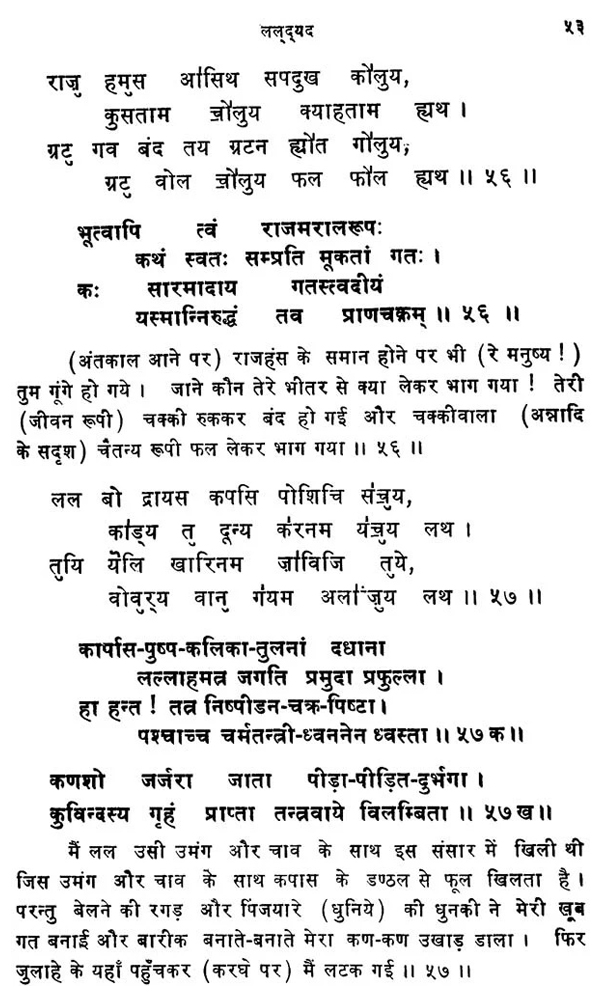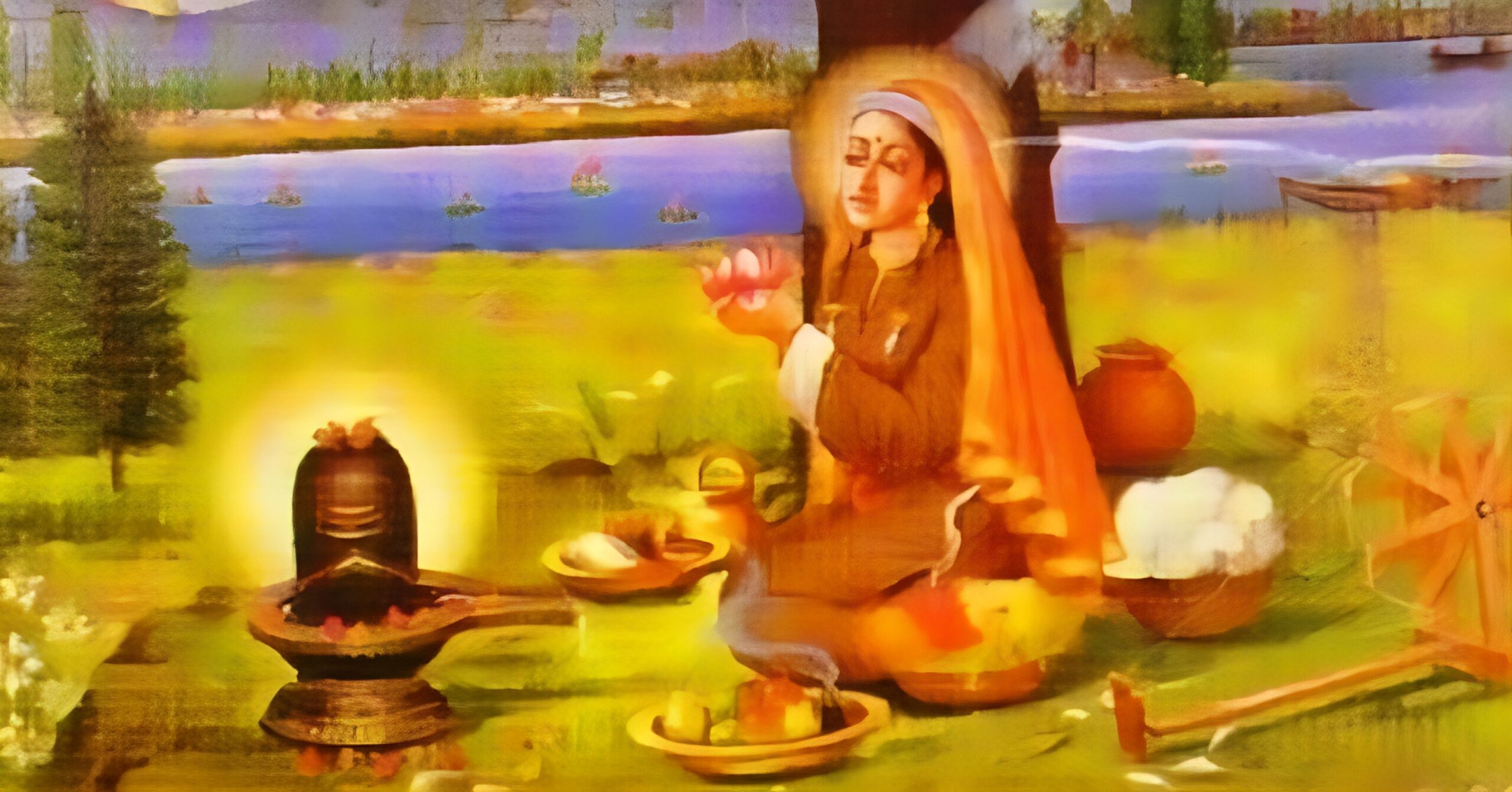
In the heart of the mesmerizing Kashmir Valley, a land often referred to as “Paradise on Earth,” lies the enchanting tale of a mystic poetess whose words transcended time and touched the souls of generations to come.
Lalleshwari, also known as Lalla Ded, Lal Ded, or simply Lalla, was a 14th-century Kashmiri saint, a philosopher, and a poetess whose verses continue to echo through the annals of history, carrying with them profound spiritual insights and a message of unity, love, and liberation.
Early Life and Spiritual Awakening

Lalleshwari’s early life is shrouded in legend and lore, but the essence of her journey is one of transformation from a young bride to a revered spiritual luminary. Born in 1320 CE in Pandrethan, a village near Srinagar, Lalleshwari’s life took a turn when she was married at a young age to a man who was considerably older than her. Despite her societal duties and responsibilities, the young bride was not content with the conventional path that had been laid out for her.
Her inner yearning for spiritual truth led her to seek out the company of wandering ascetics and saints. Her interactions with these spiritual wanderers ignited a spark within her, propelling her toward a life of renunciation and introspection. In a society where women’s roles were often confined to the domestic sphere, Lalleshwari’s decision to embark on a spiritual journey of self-discovery was nothing short of revolutionary.
The Path of Mysticism and Poetry
Lalleshwari’s spiritual quest led her to forsake societal norms and embrace the life of a wandering ascetic. She embarked on a journey of self-realization and divine union, choosing the path of mysticism to seek a direct connection with the Divine. Her wanderings took her through the scenic landscapes of Kashmir, from the bustling markets of Srinagar to the serene meadows and majestic mountains that surrounded her.
Vakhs: Wisdom in Verse

However, Lalleshwari’s contribution to spiritual literature is perhaps her most enduring legacy. She expressed her profound insights, experiences, and wisdom through the medium of poetry. Using the Kashmiri language, she crafted verses that not only reflected her personal spiritual journey but also delved into the broader themes of existence, the nature of reality, and the pursuit of self-liberation.
Lalleshwari’s poetic compositions, known as “Vakhs,” are a testament to her exceptional literary and spiritual prowess. Through these verses, she conveyed her deep understanding of complex spiritual concepts in simple yet profound language. Her poetry transcended the boundaries of traditional religious discourse, making her teachings accessible to people from all walks of life.
The Vakhs are characterized by their mystical themes, vivid imagery, and rhythmic flow. Lalleshwari often used metaphors from everyday life, such as weaving, farming, and cooking, to illustrate spiritual truths. Her ability to draw parallels between the ordinary and the divine allowed her to bridge the gap between the esoteric and the accessible.
In her Vakhs, Lalleshwari explored the concepts of impermanence, detachment, and the nature of reality. She emphasized the importance of transcending dualities and attachments, urging her readers to seek the eternal amidst the transient. Her verses echo the essence of Advaita Vedanta, emphasizing the oneness of all existence and the ultimate unity of the individual soul with the Divine.

Philosophical Teachings and Impact
Lalleshwari’s philosophy, rooted in Kashmiri Shaivism, embodies a unique blend of mysticism, Vedanta, and Sufi thought. She saw divinity not as a distant entity but as an intrinsic aspect of human existence. Her teachings highlighted the potential for self-realization and the direct experience of the Divine within oneself.
One of her most famous Vakhs captures the essence of her teachings:
“Shiva resides in everyone’s heart. Do not damage or hurt any heart. Do not defile anybody’s heart.”
This verse encapsulates her message of compassion, non-violence, and the recognition of divinity within all beings. It reflects her belief in the unity of all existence and the need for empathy and understanding.
Legacy and Continuity
Lalleshwari’s impact on Kashmiri culture, spirituality, and literature is immeasurable. Her teachings inspired subsequent generations of mystics, poets, and thinkers. Her profound insights into the nature of reality and the human condition continue to resonate with seekers of truth, irrespective of cultural or religious boundaries.
Her legacy is also reflected in the popular folk songs and traditions of Kashmir. Her Vakhs have been passed down through generations and remain an integral part of Kashmiri culture. Even in contemporary times, her verses are recited, studied, and revered by those seeking spiritual guidance and wisdom.

People also ask:
-
Are there any modern references to Lalleshwari’s teachings?
In modern times, Lalleshwari’s teachings are still studied and revered. Her wisdom continues to be a source of inspiration for those seeking a deeper connection with the spiritual essence of life.
-
How has Lalleshwari’s message transcended cultural boundaries?
Lalleshwari’s message of unity, compassion, and self-realization resonates beyond Kashmiri culture. Her teachings have inspired seekers and scholars worldwide, fostering a deeper understanding of spirituality.
-
How does Lalleshwari’s life challenge traditional gender roles?
Lalleshwari’s decision to renounce societal norms and embark on a spiritual journey challenged traditional gender roles, especially in her time. Her life serves as an inspiration for women seeking self-realization and spiritual growth.
-
How has Lalleshwari’s legacy been preserved over time?
Lalleshwari’s legacy has been preserved through the oral transmission of her Vakhs, which have been passed down through generations. Her teachings continue to be recited, studied, and revered in Kashmiri culture.
-
What themes did Lalleshwari’s poetry explore?
Lalleshwari’s poetry delved into themes of self-realization, unity, compassion, and the transient nature of existence. She often used metaphors from daily life to illustrate profound spiritual truths.
-
What language did Lalleshwari’s poetry use?
Lalleshwari composed her verses in the Kashmiri language, making her teachings accessible to the common people.
-
What are “Vakhs” and why are they important?
“Vakhs” are poetic verses composed by Lalleshwari. These verses convey her spiritual insights, emphasizing themes such as detachment, oneness, and the nature of reality. They are considered a significant contribution to Kashmiri literature and philosophy.
-
What is the historical background of Lalleshwari’s life?
Lalleshwari was born in 1320 CE in Pandrethan, near Srinagar, Kashmir. She was married at a young age but chose to follow a spiritual path, renouncing societal norms to seek self-realization.
-
What is Lalleshwari’s significance in Kashmiri culture?
Lalleshwari holds immense significance in Kashmiri culture as a spiritual luminary. Her poetry and teachings have deeply influenced the region’s literature, philosophy, and religious thought.
Summary of Lalleshwari
Lalleshwari, the revered Kashmiri saint and mystic poet, stands as a timeless symbol of spiritual wisdom and universal love. Her life and teachings remind us that the quest for truth transcends societal norms and that the path of self-discovery is open to all, regardless of gender or background. Through her sublime poetry, she illuminated the complexities of spirituality, making them accessible to the common person.
As we delve into the verses of Lalleshwari, we are reminded of the eternal quest for understanding, the unity of all existence, and the profound truth that the Divine resides within each of us. Her legacy continues to shine as a guiding light, inviting us to explore the depths of our own consciousness and embrace the interconnectedness of all life.
